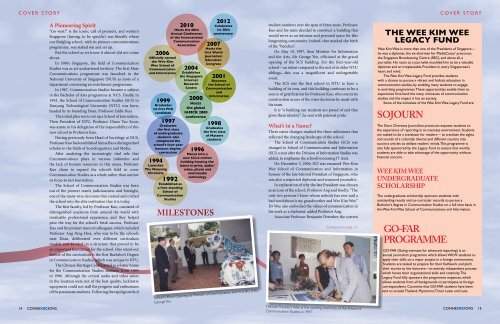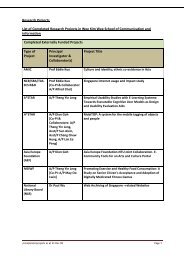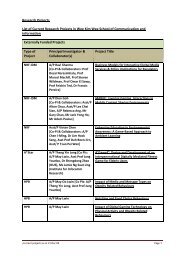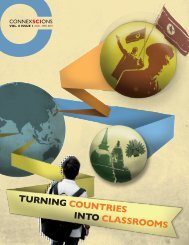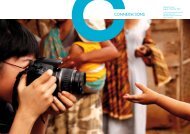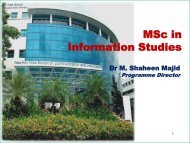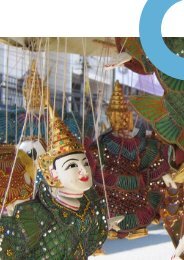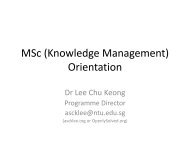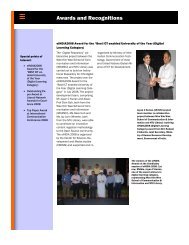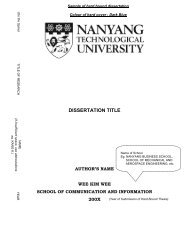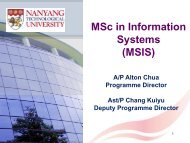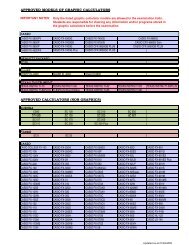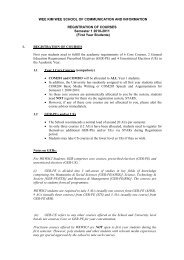Connexscions Volume VIII Issue 02 Jan - WKWSCI Home - Nanyang ...
Connexscions Volume VIII Issue 02 Jan - WKWSCI Home - Nanyang ...
Connexscions Volume VIII Issue 02 Jan - WKWSCI Home - Nanyang ...
Create successful ePaper yourself
Turn your PDF publications into a flip-book with our unique Google optimized e-Paper software.
COVER STORY<br />
14 CONNEXSCIONS<br />
A Pioneering Spirit<br />
“Go west!” is the iconic call of pioneers, and western<br />
Singapore (Jurong, to be specific) was literally where<br />
our fledgling school, with its pioneer communications<br />
programme, was staked out and set up.<br />
But the school as we know it almost did not come<br />
about.<br />
In 1980s Singapore, the field of Communication<br />
Studies was as yet unchartered territory. The first Mass<br />
Communications programme was launched in the<br />
National University of Singapore (NUS) as more of a<br />
department overseeing an enrichment programme.<br />
In 1987, Communication Studies became a subject<br />
in the Bachelor of Arts programme at NUS. Finally, in<br />
1993, the School of Communication Studies (SCS) in<br />
<strong>Nanyang</strong> Technological University (NTU) was born,<br />
headed by its founding Dean, Professor Eddie Kuo.<br />
The initial plan was to set up a School of Journalism.<br />
Then-President of NTU, Professor Cham Tao Soon,<br />
was astute in his delegation of the responsibility of this<br />
new school to Professor Kuo.<br />
Having previously been Head of Sociology at NUS,<br />
Professor Kuo had established himself as a distinguished<br />
scholar in the fields of Sociolinguistics and Media.<br />
After analysing the increasingly vital role that<br />
Communications plays in various industries and<br />
the lack of human resources in this arena, Professor<br />
Kuo chose to expand the school’s field to cover<br />
Communication Studies as a whole rather than narrow<br />
its focus to just Journalism.<br />
The School of Communication Studies was born<br />
out of the pioneer team’s judiciousness and foresight,<br />
one of the many wise decisions that created and crafted<br />
the school into the elite institution that it is today.<br />
The first faculty, led by Professor Kuo, consisted of<br />
distinguished academia from around the world with<br />
invaluable professional experience, and they helped<br />
pave the way for the school’s brisk success. Professor<br />
Kuo and his pioneer team of colleagues, which included<br />
Professor Ang Peng Hwa, who was to be the school’s<br />
next Dean, deliberated over different curriculum<br />
models and decided on a structure that proved to be<br />
an important foundation for the school. One stand-out<br />
feature of the curriculum is the first Bachelor’s Degree<br />
in Communication Studies, which was unique to NTU.<br />
The Chinese Heritage Centre acted as a foster home<br />
for the Communication Studies students from 1993<br />
to 1996. Although the critical audio and video suites<br />
in the location were not of the best quality, lacklustre<br />
equipment could not stall the progress and enthusiasm<br />
of the passionate students. Following the rapid growth of<br />
2006<br />
Officially named<br />
the Wee Kim<br />
Wee School of<br />
Communication<br />
and Information<br />
1999<br />
Graduates<br />
its first PhD<br />
candidate<br />
1997<br />
Graduates<br />
the first class<br />
of undergraduate<br />
students who<br />
completed the<br />
school’s four-year<br />
honours degree<br />
curriculum<br />
1994<br />
Launches<br />
The <strong>Nanyang</strong><br />
Chronicle<br />
2010<br />
Hosts the 60th<br />
Annual Conference<br />
of the International<br />
Communication<br />
Association<br />
1992<br />
Established as<br />
a free-standing<br />
School of<br />
Communication<br />
Studies<br />
2004<br />
Establishes<br />
the Singapore<br />
Internet<br />
Research<br />
Centre<br />
2000<br />
Hosts<br />
the global<br />
IAMCR 2000<br />
conference<br />
1996<br />
Moves into a<br />
new $22.6 million<br />
building housing the<br />
latest in print, audio/<br />
video, photo and<br />
multimedia<br />
technology<br />
MILESTONES<br />
2012<br />
Celebrates<br />
its 20th<br />
anniversary<br />
2007<br />
Hosts the<br />
first World<br />
Journalism<br />
Education<br />
Congress<br />
2001<br />
Becomes<br />
the School of<br />
Communication<br />
and<br />
Information<br />
1998<br />
Graduates<br />
the first class<br />
of Masters<br />
students<br />
School Official Opening by Minister of Commuication and Arts BG (NS)<br />
George Yeo<br />
student numbers over the span of three years, Professor<br />
Kuo and his team decided to construct a building that<br />
would serve as an intimate and personal space for this<br />
burgeoning community. Indeed, that marked the birth<br />
of the “benches”.<br />
On May 10, 1997, then Minister for Information<br />
and the Arts, Mr George Yeo, officiated at the grand<br />
opening of the SCS building. For the four-year-old<br />
school—an infant compared to the rest of its older NTU<br />
siblings—this was a magnificent and unforgettable<br />
event.<br />
The SCS was the first school in NTU to have a<br />
building of its own, and this building continues to be a<br />
source of gratification for Professor Kuo, who counts its<br />
construction as one of the wiser decisions he made with<br />
his team.<br />
It is “a building our students are proud of and that<br />
gives them identity”, he said with paternal pride.<br />
What’s in a Name<br />
Three name changes marked the three milestones that<br />
reflected the changing landscape of the school.<br />
The School of Communication Studies (SCS) was<br />
changed to School of Communication and Information<br />
(SCI) a year after the Division of Information Studies was<br />
added, to emphasise the school’s increasing IT slant.<br />
On December 5, 2006, SCI was renamed Wee Kim<br />
Wee School of Communication and Information in<br />
honour of the late beloved President of Singapore, who<br />
was also a respected diplomat and seasoned journalist..<br />
In explanation of why the late President was chosen<br />
as an icon of the school, Professor Ang said fondly, “The<br />
only two persons I know whom nobody has ever said a<br />
bad word about is my grandmother and Wee Kim Wee.”<br />
Dr Wee also embodied the values of communication in<br />
his work as a diplomat, added Professor Ang.<br />
Associate Professor Benjamin Detenber, the current<br />
Continued on page 16<br />
The late President Wee at the opening ceremony of the School of<br />
Communication Studies in 1997<br />
THE WEE KIM WEE<br />
LEGACY FUND<br />
Wee Kim Wee is more than one of the Presidents of Singapore—<br />
he was a diplomat, the ex-chairman for MediaCorps’ precursor,<br />
the Singapore Broadcasting Centre (SBC), and above all, a<br />
journalist. His roots as a journalist moulded him to be a valuable<br />
diplomat and an irreplaceable President in every Singaporean’s<br />
heart and mind.<br />
The Wee Kim Wee Legacy Fund provides students<br />
with a chance to pursue a vibrant and holistic education in<br />
communication studies, by enabling many students to engage<br />
in enriching programmes. These opportunities enable them to<br />
experience first-hand the many intricacies of communication<br />
studies and the impact it has on society.<br />
Some of the initiatives of the Wee Kim Wee Legacy Fund are:<br />
SOJOURN<br />
The Short Overseas Journalism practicum exposes students to<br />
the experience of reporting in an overseas environment. Students<br />
are tasked to be a translator for readers— to translate the sights<br />
and sounds of a culturally diverse and different country into<br />
succinct articles to titillate readers’ minds. This programme is<br />
also fully sponsored by the Legacy Fund to ensure that worthy<br />
students are able to take advantage of the opportunity without<br />
financial concern.<br />
WEE KIM WEE<br />
UNDERGRADUATE<br />
SCHOLARSHIP<br />
The undergraduate scholarship sponsors students with<br />
outstanding results and co-curricular records to pursue a<br />
Bachelor’s degree in Communication Studies on a full time basis in<br />
the Wee Kim Wee School of Communications and Information.<br />
GO-FAR<br />
PROGRAMME<br />
COVER STORY<br />
GO-FAR (Going overseas for advanced reporting) is an<br />
annual journalism programme which allows WKW students to<br />
apply their skills on a major project in a foreign environment.<br />
Students are tasked to prepare for their fieldwork and pitch<br />
their stories to the lecturers—an entirely independent process<br />
which hones their organisational skills and creativity. The<br />
Legacy Fund fully sponsors the programme expenses, which<br />
allows students from all backgrounds to participate as foreign<br />
correspondents. Countries that GO-FAR students have been<br />
sent to include Thailand, Myannmar, Timor Leste and Laos.<br />
CONNEXSCIONS 15


